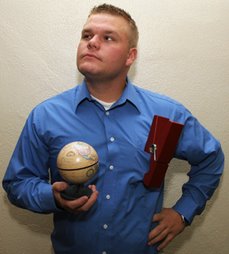
Well, I don’t really know exactly what my purpose is, or whether or not I know exactly what I mean by purpose. I personally think that the definition of purpose is summed up pretty well by the first few lines of the “Avenue Q” soundtrack, which goes as follows:
“Purpose, it’s that little flame, that lights a fire under your ass;
Purpose, it keeps you going strong, like a car with a full tank of gas…”
I know that, as I have stated before, I am content in my situation, but I am not sure that is enough. I don’t have that flame that ignites passion in my life.
If you ask any of my friends, I tend to be a very ‘big picture’ type of guy; however, I am in a rut of seeing myself as one very small person in an arena that requires you to be a giant in order to effect the tiniest amount of change. I don’t like this mindset, at all and I am trying to figure out how to get over it.
How do you define your own purpose? Is it already set for you, or do you decide it via the decisions you make daily, large and small?

1 comment:
Great post -- very thought-provoking!
First of all, as a lapsed Catholic, I appreciate what evangelicals do to heal people's self-esteem and inspire personal initiative. But I also feel that the evangelical leaders sometimes veer off-course into a kind of ego inflation. They idolize the individual at the expense of neighbors and community.
When I hear evangelical leaders dwell on individuals' scorecards (agendas?) for achieving success in the afterlife, I think about all that they risk overlooking in God's creation in this life. And I grow concerned about their motives.
I don't believe Jesus' intent was for Christians to be "happy" or prosperous. I find purpose in resolving the aspects of Jesus' life and journey that I identify or empathize with:
Personally, I feel drawn to understand the poverty, illness, and dirtiness of the people in Jesus' neighborhoods and communities -- and the fact that Jesus actually tried to lessen poverty and heal illness, he didn't just preach at people, blame them or their parents/ancestors for their situations, and tell them to wait for heaven.
I recognize the arrogance and sin of the fundamentalists of the time.
From those touchstones, I tried for years to figure out what to do next.
For a while I helped illegal aliens gain legal residency. Then I was a buddy to people with AIDS. Then I educated teen-age men about date-rape vs. respect for women. Then I sought to minister to people who were badly misinformed about gay people. Then I encountered ex-gay activists and their own misinformation.
Lately I've been less interested in ex-gays, and far more concerned about pollution and global warming (though it's been a concern of mine for 20 years). I don't think Jesus would go around today acting as a giant like we do. Each year, each one of us spews tons of automotive CO2 and carbon monoxide and hundreds of pounds of plastic, paper, aluminum, and styrofoam garbage.
We're acting like giants.
China and India are catching up with our collective individual desires to act like giants, and so problems like oil shortages and greenhouse gases are worsening rapidly.
If we are blessed with a long life, then there's enough time in life for many purposes, so I don't worry as much as I used to, about what I'm supposed to be doing.
And since global crises are the collective result of billions of individual actions (especially when we act like giants), I personally am coming to believe it's very important for people *not* to be giants, but to be -- like Jesus -- as humble and modest as possible.
Positive global change is accomplished through billions of small individual actions and through communal cooperation and dialogue. Jesus didn't cure millions of people, he cured a few handfuls of people. He didn't feed fish to millions, he fed a crowd. He didn't start a populist war against his religious opponents, he sacrificed his own life to them.
Post a Comment